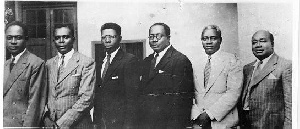 The Big Six are credited with Ghana's independence struggle
The Big Six are credited with Ghana's independence struggle
Ghanaians are involved in a futile debate about our founding fathers and this has led some to question the wisdom of debating history while big current problems are neglected.
Let me confess that I am not a historian. However, I am here to assert that history matters.
The current middle East problems that have led to periodic fighting and is currently manifesting in ISIS and Syria after the September 11th attacks are rooted firmly in history, dating back to when Christ and later Mohammed roamed the earth.
The Russian invasion of the Caucasus and their disputes with Ukraine have their roots in history.
The racial tensions that are on display now in America and have been manifested by the "Black Lives Matter" movement date back to slavery and America's birth defect manifested by their failure to recognise blacks as equals.
South Africa's current racial tensions date back to Chaka, apartheid and events of those far-off years.
The current Kenyan election campaign pitting a Kenyatta against an Odinga and the background concerns about violence have historical roots. This is not the first contest between a Kikuyu Kenyatta and a Luo Odinga.One cannot understand Brazil's O jogo bonito without understanding the influence of blacks on Brazilian culture.
It is impossible to understand the ethnic tensions that bedevil Nigeria with understanding Biafra and the roles of Belewa, Ironsi, Ojukwu and Gowon, amongst others.
Our dead leaders, wars and wrongs still live amogst us, influencing us for better or for worse.
We cannot truly appreciate the progress and problems of medicine without understanding what has been before.Take infections.
We cannot understand where we are without understanding Jenner and Lister and Semelweis and Fleming and their roles in vaccination, antisepsis and the discovery of penicillin respectively.
One cannot understand civil rights in America without understanding the Dred Scott, Plessy vs Ferguson and Brown vs Board of education decisions.
Indeed, successful countries and polities are always conscious of their history. During the Clinton era, C-span had a presidential series that showed the preserved homes of every President, beginning with George Washington.
Today, Americans discuss the civil war and Lee and Grant; the second world war and places like Iwo Jima and Normandy as if it were yesterday. Meanwhile in Ghana, we can't find the home of Nkrumah or the grave of Robert Mensah!.
When Nixon met with Clinton in 1994 to discuss the North American Free Trade Accord, he did not have statistics. He just asked President Clinton to read the history of the Corn laws of 1815 and how it affected Britain's development.Clinton did and ended up supporting Free Trade.
If the people of Liberia and Ivory Coast and Angola had studied the Nigerian civil war, maybe they would have had no civil wars with the needless loss of lives.
In the area of tourism, history is money. Charleston, in South Carolina has become one of the leading tourists destinations based on its infamous role as the disembarking point for most slaves. It is at the centre of a multi-billion dollar tourism industry while places like Cape Coast and Goree where the slaves started their shameful trans-atlantic journey wallow in poverty and anonymity.
If Ghanaians took history seriously, the periodic rantings of President Rawlings would be treated as nothing more than comedy because we would know that no leader has had a better chance to tackle corruption and done less.
If Africans cared about history, we would know that the IMF, the World Bank, the West and China engage us, not to build Africa but to build their economies. That is why late Hugo Chavez handed Obama a copy of Eduardo Galliano's "VEINS OF LATIN AMERICA " when they first met.
Santayana was right that those who ignore history are condemned to repeat its tragedies.
We must learn our history. It must help to illuminate our problems and help us find solutions. It must not be used to confuse us or to divert us from our problems.History is not part of our problems. It is part of our solutions.